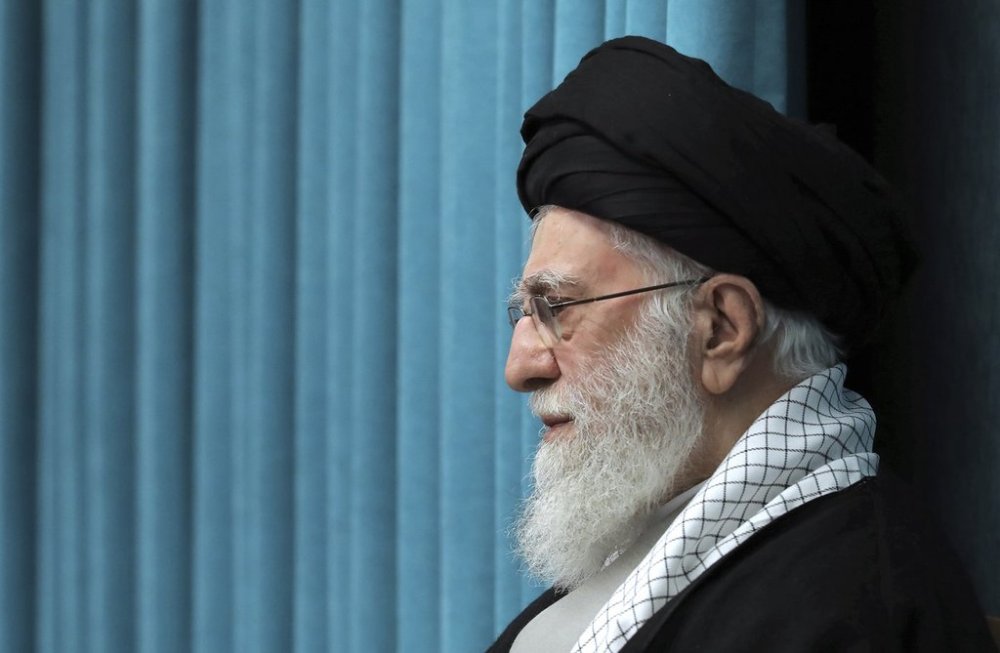Iran’s top leader rejects talks with the US over missile range, regional influence
Advertisement
Read this article for free:
or
Already have an account? Log in here »
To continue reading, please subscribe:
Monthly Digital Subscription
$0 for the first 4 weeks*
- Enjoy unlimited reading on winnipegfreepress.com
- Read the E-Edition, our digital replica newspaper
- Access News Break, our award-winning app
- Play interactive puzzles
*No charge for 4 weeks then price increases to the regular rate of $19.00 plus GST every four weeks. Offer available to new and qualified returning subscribers only. Cancel any time.
Monthly Digital Subscription
$4.75/week*
- Enjoy unlimited reading on winnipegfreepress.com
- Read the E-Edition, our digital replica newspaper
- Access News Break, our award-winning app
- Play interactive puzzles
*Billed as $19 plus GST every four weeks. Cancel any time.
To continue reading, please subscribe:
Add Free Press access to your Brandon Sun subscription for only an additional
$1 for the first 4 weeks*
*Your next subscription payment will increase by $1.00 and you will be charged $16.99 plus GST for four weeks. After four weeks, your payment will increase to $23.99 plus GST every four weeks.
Read unlimited articles for free today:
or
Already have an account? Log in here »
Hey there, time traveller!
This article was published 08/03/2025 (248 days ago), so information in it may no longer be current.
TEHRAN, Iran (AP) — Iran’s Supreme Leader Ayatollah Ali Khamenei said he rejects a U.S. push for talks between the two countries because they would be aimed at imposing restrictions on Iranian missile range and its influence in the region.
Speaking to a group of officials on Saturday, Khamenei did not identify the United States by name but said a “bullying government” was being persistent in its push for talks.
“Their talks are not aimed at solving problems, it is for … let’s talk to impose what we want on the other party that is sitting on the opposite side of the table.”

Khamenei’s remarks came a day after President Donald Trump acknowledged sending a letter to Khamenei seeking a new deal with Tehran to restrain its rapidly advancing nuclear program and replace the nuclear deal he withdrew America from during his first term in office.
Khamenei said U.S. demands would be both military and related to the regional influence of Iran.
“They will be about defense capabilities, about international capabilities of the country. (They will urge Iran) not to do (certain) things, not to meet some certain people, not to go to a certain place, not to produce some items, your missile range should not be more than a certain distance. Is it possible for anybody to accept these?”
Khamenei, who has final say on all state matters, said such talks would not address solving problems between Iran and the West. Though Khamenei did not name any person or country, he said the push for talks creates pressure on Iran in public opinion. “It is not negotiation. It is commanding and imposition,” he said.
Trump in comments to reporters in the Oval Office on Friday did not mention the letter directly. But he made a veiled reference to possible military action, saying: “We have a situation with Iran that, something’s going to happen very soon. Very, very soon.”
His overture comes as both Israel and the United States have warned they will never let Iran acquire a nuclear weapon, leading to fears of a military confrontation as Tehran enriches uranium at near weapons-grade levels — something only done by atomic-armed nations.
Tehran has long maintained its program is for peaceful purposes, even as its officials increasingly threaten to pursue the bomb as tensions are high with the U.S. over its sanctions and with Israel as a shaky ceasefire holds in its war against Hamas in the Gaza Strip.
Iran’s accelerated production of near weapons-grade uranium puts more pressure on Trump. He’s repeatedly said he’s open to negotiations with the Islamic Republic while also increasingly targeting Iran’s oil sales with sanctions as part of his reimposed “maximum pressure” policy.
Late in August, Khamenei in a speech opened the door to possible talks with the U.S., saying there is “no harm” in engaging with the “enemy.” However, more recently the supreme leader tempered that, saying that negotiations with America “are not intelligent, wise or honorable,” after Trump floated nuclear talks with Tehran.

